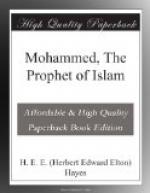VI.—MOHAMMED AND WOMEN.
The prophet’s domestic life exerted considerable influence upon his religion; effects of which are to be seen in the Mohammedan home of to-day. His numerous marriages afforded experience which led to the framing of many “divine” laws referring to women. As has already been hinted, Kadijah, his first wife, exercised considerable influence over his prophetic career. She evidently had a strong affection for him, which feeling was heartily reciprocated. She had a personality strong enough to curb his natural passion, and to preserve her place in spite of it in his regard. Her encouragement and support when success and failure were trembling in the balance, urged him to persist in the development of his ideas. He was faithful to her during their married life, and to her memory afterwards, and promised her, upon her deathbed, that she should share his heavenly chamber after his death, with the Mother of Jesus and the sister of Moses. Within a month of her death he was betrothed to Ayesha, a child of seven. He did not actually marry her until she was nine years of age, and during the interval consoled himself by wedding a widow who had acted as nurse to one of his daughters. This marriage seems to have been more a matter of convenience than of affection on his part, and in later days she was able to keep her position as his wife only by the yielding of certain of her privileges to other members of the harem.
Seven months after his arrival in Medinah, during the time of poverty, the marriage with Ayesha was celebrated, the child of nine being united to the man of fifty-three! a marriage defended on the ground of political expediency, whereby the devotion of Abu Bakr, the child’s father was strengthened. She seems to have been second only to Khadijah in the prophet’s affections, and exercised a petty tyranny over him, which was submitted to even when it affected his revelations. She excited the envy of the other wives because of her privileges, and in spite of intrigue, was able to hold her own. She was extremely sarcastic in regard to some of the revelations, and even went so far on one occasion as to jeer the prophet on his faithfulness in recording them. This sarcasm was prompted by jealousy, because of Mohammed’s marriage with Zainab, which was so illegal as to cause him to throw the responsibility on God. Zainab was the wife of the prophet’s adopted son Zaid, who, having discovered his foster-father’s love, thought it wise to divorce her in his favour. The revelation Mohammed produced seems to have been held over until his critics had been mollified by some victory—hence the sarcasm!




